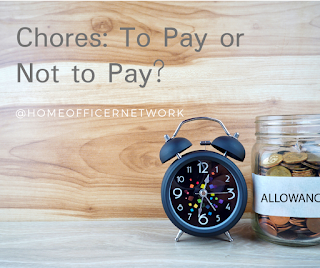Children's Chores - A Job or a Responsibility?
Not even a week later, I was chatting with another college friend who teaches at a private girls' academy in Seattle, Washington, which attracts the daughters of tech titans, and other families of wealth and privilege. The subject of chores came up again, and she shared her observation (without any prompting from me!) that she could tell within the first week of a new semester which girls had regular chores and which did not. It was reflected in their sense of responsibility to complete all homework assignments, their participation in group projects, and general behavior. I was intrigued to hear these observations.
Chores are one of those parenting "things" that attracts a lot of opinions, approaches, methodologies, and frustrations. And I feel like this pandemic has bubbled it to the surface in a new way, as we've all been forced to live within our own 4 walls a whole lot more than we ever have. We haven't liked what we saw: dirt, grime, piles of clothes (mostly sweat pants), the build-up around the faucets and sinks, and the dishes! So many dishes! (How and why do they eat so much, all the time???) We've all been living in it, so I know a lot of families (ours included) who are making a point of ensuring we all take care of it. But here's one point that is very sticky: to pay, or not to pay? That is the question!
I conducted a poll in a few parenting Facebook groups to see if there was a leading sentiment on the subject of paying kids for completing chores. As it turned out, the results were very interesting:
We have set chores that we don't pay for, it's just her responsibility and contribution as a part of being in the family. - R.A.
And the age of your kids might factor in, too, as this mom shared:
My kids have jobs. They all started working at 14, so I don’t have to supply them with “fun” money. I don’t get paid for housework, neither do you... - A.R.
When he was little, I would give him a roll of quarters at the beginning of each week. If I asked him to do a chore and it wasn’t done, he owed me 50 cents. However many quarters he had at the end of the week were his allowance. When he started to get older, I gave him ten $1 bills...that hurt a little more when he had to hand one over! Since I was a single mom, I also took money for sass. 😉 - L.J.
As it turns out, my husband and I had just adopted a similar approach with our girls. During the week, if there is any talking back or they say “No!” when asked to help with something, they get a deduction from their next payday. If they are proactive, however, and do something helpful or kind without being asked, they can earn back that deduction. It's early days, but so far it's been helpful in reducing battles about finishing chores.
Another 25% said they pay their children per chore, while the final 3% shared they would pay for their child to complete a special project. I particularly appreciate this perspective:
If my kids need to raise money, I will give them (cruel &) unusual chores that are worth money to me to have done (such as vacuuming my car), but never will I pay them for doing chores around the house. I'm trying to raise feminist boys with a strong sense of community and personal responsibility, after all. ♥️ - S.M.
The over-arching theme from my non-scientific research was that many participating parents feel it is important to them that their children contribute to the maintenance and upkeep of the home simply because they are a part of the family, and it is every family member's responsibility to take part in caring for the home environment, regardless of whether they choose to compensate their children for this expectation or not.
Responsible, contributing member of the family. That's a common goal for our children!
Thanks to the many parents who participated in my poll! I look forward to sharing more results in the near future! In the meantime, what has worked best for you when setting up chore expectations for your kids?
Join the Home Officer Network on Facebook, Instagram, and Twitter!





Comments
Post a Comment